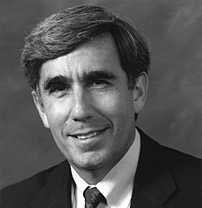A
New Court to Uphold
International Criminal
Law:
The
World Moves Forward
Without the United States

By
David
Krieger
President, The
Nuclear Age Peace Foundation
TFF
associate
April 30, 2002
Since the devastating carnage of World War II, a war
that left some 50 million people dead, far-sighted
individuals have worked for a world in which the force of
law will prevail over the law of force. The first step
toward realizing this vision was the establishment of the
Nuremberg Tribunals to hold leaders of the Axis powers to
account for crimes committed under international law.
This unprecedented step on the part of the Allied powers
was led by the United States.
The American Supreme Court Justice, Robert Jackson,
who became the US chief prosecutor at Nuremberg, argued
in his opening statement: "We must summon such detachment
and intellectual integrity to our task that this trial
will commend itself to posterity as fulfilling humanity's
aspirations to do justice."
Following the trials, the United Nations General
Assembly adopted the Principles of Nuremberg, principles
of individual accountability that were meant to serve as
a standard and a warning to potential violators of
international law, no matter how high their position. The
first principle stated: "Any person who commits an act
which constitutes a crime under international law is
responsible therefor and liable to punishment."
Principle two clarified that the perpetrator of a
crime under international law was not exempted from
responsibility by the fact that the crime was not subject
to penalty under the internal law of his or her nation.
The third principle made clear that even Heads of State
and responsible government officials were to be held
accountable for acts constituting crimes under
international law. The fourth principle provided that
superior orders were not a defense to the commission of
crimes under international law.
Principle five allowed that anyone charged with a
crime under international law was entitled to a fair
trial. The sixth principle set forth the following
punishable crimes under international law: crimes against
peace, war crimes and crimes against humanity. The
seventh and final principle made complicity in any of
these crimes itself a crime under international law.
Despite the success of the Nuremberg trials and those
held in Tokyo, as well as the adoption of the Nuremberg
Principles, for more than forty years the idea of
creating a permanent International Criminal Court
languished. Then in 1989, the leader of the small island
nation of Trinidad and Tobago, Arthur N. R. Robinson, put
the issue back on the United Nations agenda.
In the 1990s the idea of creating the Court gathered
momentum at the United Nations. Ad Hoc Tribunals were
established for the crimes committed in the former
Yugoslavia and in Rwanda. And in 1998 delegates from the
nations of the world met in Rome and agreed upon a
statute for an International Criminal Court. It was
agreed in Rome that when 60 nations had ratified the
treaty establishing the Court, it would come into
existence.
In April 2002, far sooner than was predicted, the
treaty surpassed the needed 60 ratifications, and is now
set to enter into force on July 1, 2002. This is a great
day for the world. The Principles of Nuremberg can now be
made applicable to crimes committed in the Nuclear Age,
and no longer will leaders of nations be able to hide
from accountability for the most heinous of crimes under
international law.
Somehow, though, between the Nuremberg Trials and the
twenty-first century, the United States has gone from
being the strongest advocate of individual accountability
under international law to an opponent of the Court.
President Clinton signed the treaty establishing the
Court on December 31, 2000, just weeks before leaving
office. The Bush administration, however, has spoken out
against the Court, and has indicated that it may withdraw
the US signature from the treaty and apply sanctions
against countries supporting the Court. Richard Prosper,
the US ambassador at large for war crimes issues, stated,
"An action that is under consideration is annulling the
signature, making clear that we continue to oppose the
treaty, and do not intend to become a party."
When it comes to international law, the US appears to
practice a double standard. It doesn't seem to want the
same standards of international criminal law to apply to
its citizens as are applied to the citizens of the rest
of the countries in the world. Fortunately, the world is
moving forward with or without the US. Among the US
allies that have already ratified the treaty establishing
the Court are Austria, Belgium, Canada, France, Germany,
Italy, Norway, Spain, Switzerland and the UK.
Hans Correll, the UN undersecretary for legal affairs,
remarked, "A page in the history of humanity is being
turned." It is shameful that the United States, once
passionate about international justice, will not be on
this new page of international justice that gives renewed
life to the Nuremberg Principles.
David
Krieger is president of the Nuclear Age Peace
Foundation (www.wagingpeace.org). He can be contacted at
dkrieger@napf.org.
To become a free on-line participating member of the
Nuclear Age Peace Foundation,
click here: https://www.sbwh.com/wagingpeace/mbrshp.html.
©
TFF & the author 2002

Tell a friend about this article
Send to:
From:
Message and your name
|